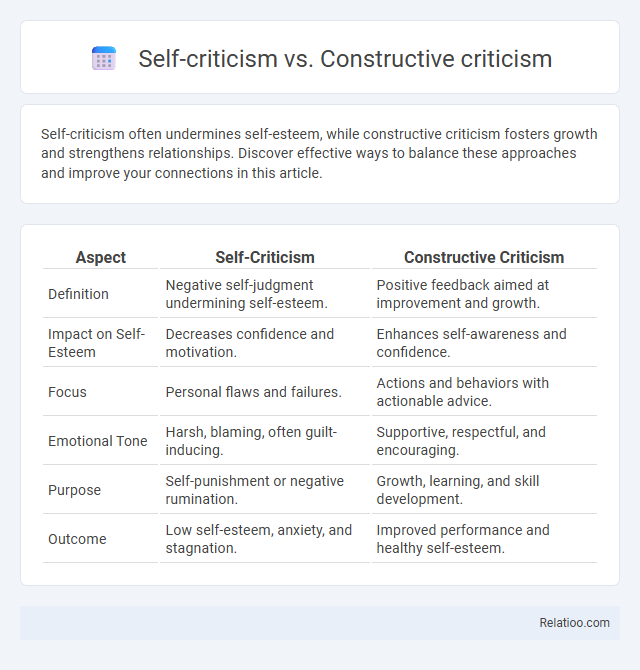Self-criticism often undermines self-esteem, while constructive criticism fosters growth and strengthens relationships. Discover effective ways to balance these approaches and improve your connections in this article.
Table of Comparison
| Aspect | Self-Criticism | Constructive Criticism |
|---|---|---|
| Definition | Negative self-judgment undermining self-esteem. | Positive feedback aimed at improvement and growth. |
| Impact on Self-Esteem | Decreases confidence and motivation. | Enhances self-awareness and confidence. |
| Focus | Personal flaws and failures. | Actions and behaviors with actionable advice. |
| Emotional Tone | Harsh, blaming, often guilt-inducing. | Supportive, respectful, and encouraging. |
| Purpose | Self-punishment or negative rumination. | Growth, learning, and skill development. |
| Outcome | Low self-esteem, anxiety, and stagnation. | Improved performance and healthy self-esteem. |
Understanding Self-Criticism: Definition and Impact
Self-criticism involves evaluating your own actions and behaviors often with a negative bias, which can lead to decreased self-esteem and increased stress if not managed properly. Constructive criticism, conversely, provides specific, actionable feedback aimed at improvement and growth without diminishing your confidence. Understanding self-criticism allows you to distinguish between harmful self-judgment and useful self-reflection, promoting healthier mental habits and personal development.
What Is Constructive Criticism? Key Features
Constructive criticism is a feedback approach aimed at helping individuals improve performance or behavior through specific, actionable suggestions rather than negative judgments. Key features include a focus on clear, objective observations, a positive tone that encourages growth, and an emphasis on solutions rather than faults. Unlike self-criticism, which can be harsh and demotivating, constructive criticism promotes learning and development by fostering a supportive environment.
Self-Criticism vs Constructive Criticism: Core Differences
Self-criticism involves evaluating your own actions or thoughts harshly, often leading to negative emotions and decreased motivation. Constructive criticism, on the other hand, aims to provide helpful, specific feedback that fosters improvement and growth without damaging self-esteem. Understanding the core differences between these two forms allows you to leverage feedback effectively while maintaining a positive mindset.
Psychological Effects of Self-Criticism
Excessive self-criticism often leads to increased stress, anxiety, and lower self-esteem, negatively impacting mental health and overall well-being. Constructive criticism, when delivered effectively, promotes personal growth and resilience by encouraging positive change without damaging self-worth. Understanding the psychological effects of self-criticism is crucial for developing healthier coping mechanisms and fostering a balanced self-assessment.
Benefits of Embracing Constructive Criticism
Embracing constructive criticism enhances your personal and professional growth by providing actionable insights that promote improvement without diminishing your self-esteem. Unlike self-criticism, which often leads to negative self-judgment, constructive criticism offers clear, objective feedback that helps you identify strengths and areas for development. This approach fosters resilience, encourages learning, and ultimately leads to better performance and confidence.
Common Triggers for Self-Criticism
Common triggers for self-criticism include perceived personal failures, unmet expectations, and social comparisons that heighten feelings of inadequacy. Unlike constructive criticism, which offers actionable feedback aimed at improvement, self-criticism often stems from an internal dialogue that emphasizes flaws without providing solutions. Understanding these triggers can help you recognize when self-criticism becomes harmful and shift toward a more balanced, growth-oriented mindset.
Turning Self-Criticism into Constructive Feedback
Turning self-criticism into constructive feedback involves shifting from negative self-judgment to actionable insights that promote growth and improvement. Instead of harshly focusing on failures, constructive feedback emphasizes specific behaviors and outcomes, fostering a mindset of learning and development. This transformation enhances motivation, resilience, and the ability to set realistic goals, making self-assessment a productive tool for personal and professional advancement.
Strategies for Giving and Receiving Constructive Criticism
Effective strategies for giving and receiving constructive criticism include focusing on specific behaviors rather than personal traits, using clear and respectful language, and providing actionable suggestions for improvement. Emphasizing empathy and active listening helps recipients process feedback without defensiveness, fostering growth and development. Distinguishing between self-criticism and constructive criticism allows individuals to balance self-awareness with external input, enhancing overall performance and emotional resilience.
Overcoming Negative Self-Talk through Constructive Criticism
Overcoming negative self-talk requires shifting from harsh self-criticism to constructive criticism that emphasizes growth and actionable feedback. Constructive criticism provides You with specific, objective insights that foster improvement without damaging self-esteem. By replacing self-critical thoughts with a balanced evaluation, You can build resilience and enhance personal development.
Building a Growth Mindset: From Self-Criticism to Self-Improvement
Self-criticism often hampers progress by inducing negative self-talk, while constructive criticism provides actionable insights that foster personal growth. Embracing constructive feedback helps you shift from a fixed mindset to a growth mindset, encouraging continuous self-improvement and resilience. Developing this balanced perspective transforms self-criticism into a powerful tool for learning and adaptation.

Infographic: Self-criticism vs Constructive criticism
 relatioo.com
relatioo.com